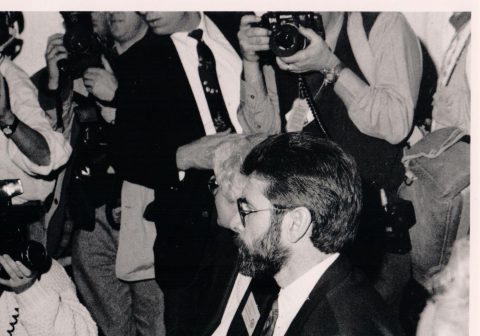Our Impact
The Northern Ireland Peace Initiative:
Under the leadership of then-Chairman William J. Flynn, the NCAFP directly contributed to the Peace Process in Northern Ireland. In 1994, the NCAFP succeeded in convincing President Bill Clinton to issue a 48-hour visa to Gerry Adams, the leader of Sinn Fein, an Irish political party that was restricted from travel to the United States due to allegations of terrorism against the British Empire. Adam’s first appearance in the United States enabled him to develop ties with key U.S. leaders, giving him and his party the assurance necessary to enter into peace negotiations and sign the Belfast Agreement.

The invitation to me from the National Committee on American Foreign Policy duly arrived. It created a major political storm…. Two days before the conference, President Clinton authorized a 48 hour visa that restricted me to the New York area. The backlash from the British government and system was hysterical. The Daily Telegraph summed it up by describing it as ‘the worst rift since Suez’….[There] can be no doubt that the granting of the visa was a major shift in U.S. foreign policy and it marked a defining moment in the development of the Irish peace process."
The invitation to me from the National Committee on American Foreign Policy duly arrived. It created a major political storm…. Two days before the conference, President Clinton authorized a 48 hour visa that restricted me to the New York area. The backlash from the British government and system was hysterical. The Daily Telegraph summed it up by describing it as ‘the worst rift since Suez’….[There] can be no doubt that the granting of the visa was a major shift in U.S. foreign policy and it marked a defining moment in the development of the Irish peace process."
The NCAFP provided an ongoing forum for the parties involved in the deadly struggle for power
(Republicans and Nationalists, Unionists and Loyalists) to resolve their differences.
The National Committee’s 1994 Conference on Northern Ireland… helped to set the stage for an historic period of U.S. engagement in promoting peace in Northern Ireland. By reaching out to key Irish and British political leaders, you contributed to IRA and loyalist cease-fires. We are grateful for your abiding commitment to the cause of peace and for your extraordinary contributions in advancing that goal."

On Cross-Taiwan-Strait Relations:
Professor Donald S. Zagoria’s Forum on Asia-Pacific Security (FAPS) began its work on cross-Taiwan Strait relations over two decades ago with traditional shuttle diplomacy between Taipei and Beijing.
The NCAFP's Forum Asia-Pacific Security’s Track II dialogue continues to be a necessary and useful mechanism in resolving the cross-Strait issue."
The NCAFP's Forum Asia-Pacific Security’s Track II dialogue continues to be a necessary and useful mechanism in resolving the cross-Strait issue."
In the Spring of 2000, cross-Strait relations were under threat of war following Taiwan’s election of President Chen Shui-bian. At the urging of senior State Department officials, the NCAFP was encouraged to visit Taiwan and caution President Chen against any reckless statements that would deteriorate a fragile situation. After visits to both capitals, President Chen gave the NCAFP credit for helping him formulate the ‘Four No’s,’ which were, in effect, a pledge not to declare de jure independence.

The NCAFP also provided a forum for then-Mayor of Taipei City, President Ma Ying-jeou, to give a presentation at a U.S.-PRC-Taiwan Track II conference that became the basis of the “1992 Consensus,” a formulation of cross-Strait relations that has allowed both sides to deepen cooperation during the Ma Administration.
We always look forward to receiving your publications. The NCAFP Forum on Northeast Asian Security’s publications and reports are highly regarded by [the government of] Taiwan."
We always look forward to receiving your publications. The NCAFP Forum on Northeast Asian Security’s publications and reports are highly regarded by [the government of] Taiwan."
The NCAFP is the only policy organization in the United States that is hosted annually for visits to Taipei and Beijing by Taiwan’s Ministry of Foreign Affairs and the PRC’s Taiwan Affairs Office.
The Six-Party Talks:
According to both U.S. and North Korean officials, our summer 2005 U.S.-DPRK Track II conference in New York played a “decisive” role in the resumption of the the Six-Party Talks in the Fall of 2005, and in the agreement of the Joint Principles reached at that meeting.
You [Prof. Donald Zagoria] did an outstanding job in arranging for the conference and facilitating our meetings in New York. You truly played a decisive role in getting this process back in motion. Our sincere thanks."
You [Prof. Donald Zagoria] did an outstanding job in arranging for the conference and facilitating our meetings in New York. You truly played a decisive role in getting this process back in motion. Our sincere thanks."
Ambassador Ri personally asked me to convey his gratitude to you and your Committee for your dedication, particularly for your setting up DPRK-US confidential meetings, which provided decisive breakthrough for the resumption of the nuclear 6 party talks to us..."
Ambassador Ri personally asked me to convey his gratitude to you and your Committee for your dedication, particularly for your setting up DPRK-US confidential meetings, which provided decisive breakthrough for the resumption of the nuclear 6 party talks to us..."
The NCAFP consults with the U.S. State Department regularly on appropriate timing for issuing temporary visas to visiting DPRK delegations and has hosted delegations from the DPRK in New York several times over the last decade, most recently in March 2012 following the Leap Day Agreement.
